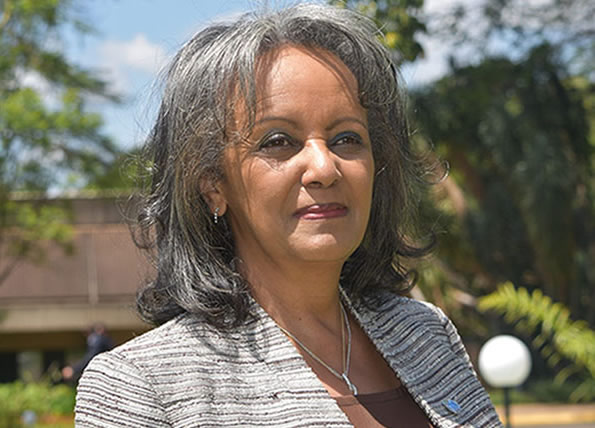
Ambassador Sahle-Work Zewde
Media portals in Ethiopia are reporting that the country will get its first woman president after President Mulatu Teshome steps down on Thursday.
The influential Addis Standard cited top government officials as confirming that Ambassador Sahle-Work Zewde, a top official with the United Nations, UN, was due to be Mulatu’s replacement.
Zewde was until recently, the UN Director General at its offices in the Kenyan capital, Nairobi. She is currently the Special representative of the UN Secretary-General to the African Union, AU.
Sahle-work has a rich ambassadorial track record having served as Ethiopian ambassador to several countries previously. Her resignation from the UN role this week is said to be to allow her take the new position of president.
She is all set to be the first woman president of Ethiopia, but only after the joint session of the two legislative houses vote her to the role tomorrow. The vote is seen as a mere formality.
In May 2018 Zewde met with Prime Minister Abiy Ahmed in Nairobi, Abiy was on an official visit to the country and visited the UN offices, where she was still head.
She described meeting Abiy as a ‘privilege and distinct honour,’ local portals reported. She will now hold a role where she will work closely with Abiy in administering the over 100 million Ethiopians.
Outgoing Mulatu Teshome had been in the presidential seat since October 2013. He has worked with erstwhile Hailemariam Desalegn and now with Abiy for a little over six months.
Article 69 of the Ethiopian constitution says, “The President of the Federal Democratic Republic of Ethiopia is the Head of State.”
What the Ethiopian Constitution says about the president
Article 70: Nomination and Appointment of the President
1. The House of Peoples’ Representatives shall nominate the candidate for President.
2. The nominee shall be elected President if a joint session of the House of Peoples’ Representatives and the House of the Federation approves his candidacy by a two-thirds majority vote.
3. A member of either House shall vacate his seat if elected President.
4. The term of office of the President shall be six years. No person shall be elected President for more than two terms.
5. Upon his election in accordance with sub-Article 2 of this Article, the President, before commencing his responsibility, shall, at a time the joint session of the Houses determines, present himself before it and shall make a declaration of loyalty to the Constitution and the Peoples of Ethiopia in the following words:
“I ….., when on this date commence my responsibility as President of the Federal Democratic Republic of Ethiopia, pledge to carry out faithfully the high responsibility entrusted to me.”
Article 71: Powers and Functions of the President
1. He shall open the joint session of the House of Peoples’ Representatives and the House of the Federation at the commencement of their annual sessions.
2. He shall proclaim in the Negarit Gazeta laws and international agreements approved by the House of Peoples’ Representatives in accordance with the Constitution.
3. He shall, upon recommendation by the Prime Minister, appoint ambassadors and other envoys to represent the country abroad.
4. He shall receive the credentials of foreign ambassadors and special envoys.
5. He shall award medals, prizes and gifts in accordance with conditions and procedures established by law.
6. He shall, upon recommendation by the Prime Minister and in accordance with law, grant high military titles.
7. He shall, in accordance with conditions and procedures established by law, grant pardon.
Source: Africa News























